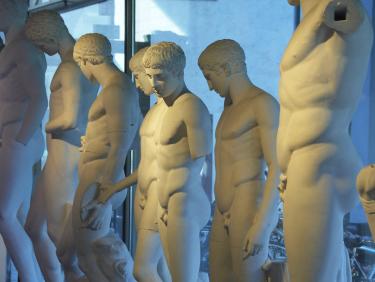Faculty of Philosophy Classical Archaeology
Classical Archaeology is the study of the material remains of ancient Greek and Roman cultures, as well as of their predecessors, the influence of these cultures on future civilisation, and of the other cultures that surrounded them. The bandwidth of material remains ranges from articles used in everyday life to structures in the settlements to artefacts and drawings. It thereby encompasses all areas in which culture is visible.
The geographical areas examined in Classical Archaeology include the core regions of Greece, Asia Minor, and Italy, as well as portions of Europe and southwest Asia.
In terms of chronological periods, studies will emphasise the earliest artefacts of the Minoan and Mycenaean cultures from the Bronze Age (3rd to 2nd millennia B.C.E.). In the centuries preceding and following the birth of Christ, emphasis will be on the Greek and Italian city-states, the Hellenic monarchies, and the Roman Empire up until the late Antiquity (4th/5th centuries C.E.). Research on the reception of antiquity in later periods, the history of archaeological research, and consideration of museological issues surrounding the public exhibition of ancient cultural artefacts extends to the present day.
Concrete research areas may also include inter-related spatial contexts – e.g. the archaeological remains of a residence, a settlement, a necropolis, a sacred site – or particularly meaningful individual artefacts, especiallysculptures.
Classical Archaeology is ultimately distinguished by the great number of epigraphic and literary texts in both Greek and Latin available to researchers, which can also lay the groundwork for stimulating discussion.

Special Features and Characteristics
Classical Archaeology at Heidelberg University is characterised by the diverse range of topics offered, which, in addition to the core areas of Greek and Roman archaeology, also includes intensive study of the Aegean Bronze Age as well as Etruscology and provincial Roman archaeology. The reception of antiquity, museology, and the study of findings from archaeological research conducted using digital media are other areas of focus. A similarly wide bandwidth is found in the areas of archaeological methodology and research topics, in which excavation/first-hand individual analysis and wide-ranging discourse on cultural theory are given equal emphasis. In addition, Classical Archaeology is embedded in a wide spectrum of other ancient studies and humanities programmes and has, as well, its own active support organisation, the FORUM ANTIKE.
The Institute’s own collection of original and plaster cast sculptures, as well as the internationally-renowned Institute library and the University library’s special “Classical Archaeology” collection, funded by the German Research Foundation (DFG), provide students with ideal resources for pursuing their studies.
In addition, the Institute actively conducts its own research projects and is also well-networked with partner universities both within Germany and abroad.
Research
The education provided at the Institute for Classical Archaeology places strong emphasis on the following research areas:
- Aegean Bronze Era
- Greek and Roman image culture, with particular emphasis on sculpture and vase painting
- Archaeological field research
- Methodology and reflection of methods in archaeology, cultural anthropology, and visual culture
- The reception of antiquity in the early modern and modern eras
- Museological conception and presentation of antique cultural artefacts in exhibits and in digital media
These primary teaching and research areas are also reflected in the following collaborations and projects:
- Minoan Kousama Reconstruction of an archaeological landscape
- Training excavation in Eisenberg/Pfalz
- Troizen Survey (Peloponnese, Greece)
- The Corpus of the Minoan and Mycenaean Seal (archive and research centre for the scientific investigation of newly-discovered Aegean seals as well as maintenance of the online database)
- Subproject A10 of the CRC 933 Material Text Cultures (Text and Image in Greek Sculpture: A Case-Study on Athens and Olympia from Archaic to Imperial Age)
- Collaboration with the Heidelberg Center for Cultural Heritage (HCCH)
Occupational Areas
Graduates of the Classical Archaeology programme traditionally pursue professions in the following areas:
- Universities
- Museums
- Major research institutions
- State Monuments Preservation offices
- Private excavation companies
Other career options include serving as an interface between the scientific community and the general public, e.g.:
- At publishing houses
- In academic journalism
- In the area of digital media visualisation
- In cultural and scientific management
Insights

I am generally very interested in history and love the fact that objects can tell a story. I chose Heidelberg for my Master’s programme because it is one of the best universities in Germany and provided me with a different perspective of the subject.
Aikaterini Vrettou, 24, Classical Archaeology, 3rd semester Master




